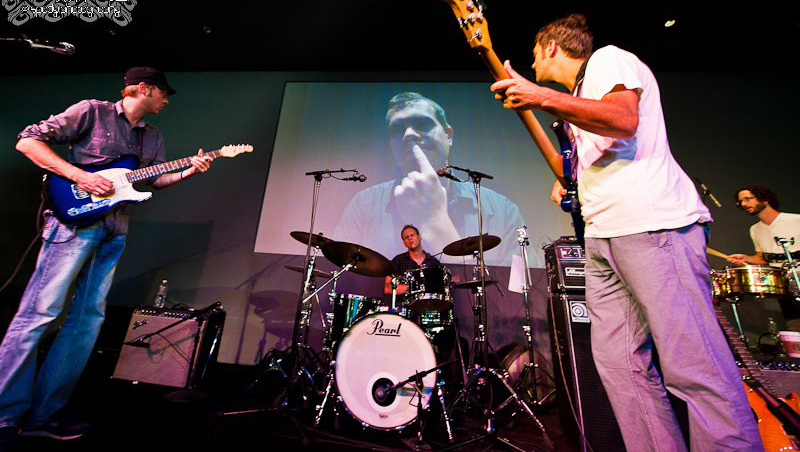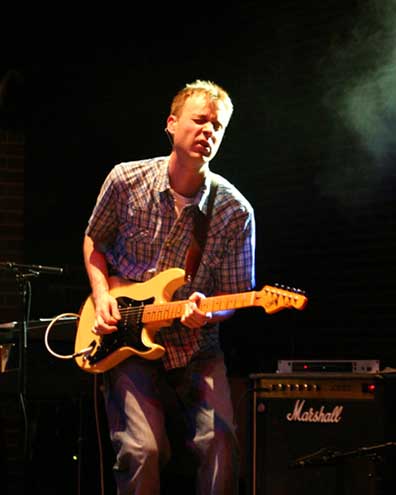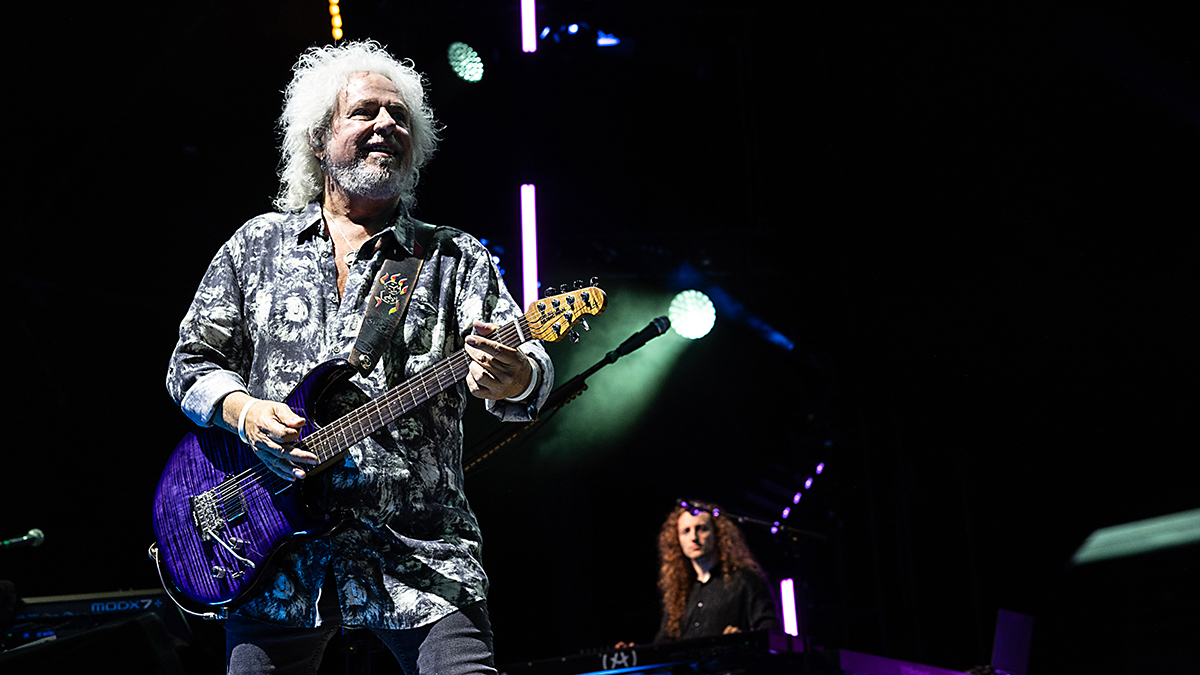Interview: Umphrey’s McGee Guitarist Jake Cinninger Discusses the Band's New Album, 'Death By Stereo'

Umphrey’s McGee may be the only nationally touring act deserving of the title "prog-rock jam band."
A staple of the jam scene for more than half a decade, the band has made a name for itself by combining bold improvisation and a guitar-heavy “progressive aggressive” approach into their incendiary live sets.
Lead guitarist Jake Cinninger is a genuine guitar ninja. He employs his colossal chops -- ranging from Randy Rhoads-style shred to Danny Gatton-inspired chicken-pickin', to create Umphrey’s eclectic prog sound.
I caught up with Cinninger to ask him about improvisation, his musical influences and Umphrey’s McGee’s new album, Death By Stereo.
GUITAR WORLD: Umphrey’s music has been described as improg, a combination of live improvisation and prog rock. Can you describe how you combine these two approaches?
Yeah, we’re all jazz- and classical-based, and then we just carry it over into the rock format. The idea of jazz being the improv and classical being sort of the progressive idea of what rock is, and trying to fuse both of those ideas together. With the six piece, we can get away with quite a bit of bells and whistles and ear candy so everyone has a role to fill. We’ll be back stage and come up with a chord progression that we’ll call an A section and then a B section and a C section, and write everything down. Then within a jam or an improv, we’ll go into this random chord progression, and sometimes lyrics will come about out of nowhere, and then we try to get back to where we once were on the set list.

So it’s more of a group approach to improvisation?
All the latest guitar news, interviews, lessons, reviews, deals and more, direct to your inbox!
Yeah, exactly. Anyone can be sheep and anyone can be the shepherd, which is cool, but you can’t have two shepherds at the same time. One person can be directing via hand signals, or we have talk-back microphones that we use where I can set up a chord progression. Say if we’re in G minor, I’ll go back to the talk back microphone and say, “OK, guys, let’s go six, four, two, one and nine,” for a chord progression. And then on the next turn around everyone can jump on it so it sounds really deliberate.
One of the coolest aspects of Umphrey’s McGee is the twin guitar attack you guys have going on. Can you describe the interplay between you and guitarist Brendan Bayliss?
Umphrey’s originally started as a one-guitar band. We were always friends back in the day because I was in a band called Ali Babas Tahini, and we were in the same town so we were always playing gigs together. So we would always get together, Bayliss and I, and chat about looking into the future an thinking, “Man, what if we tried this twin guitar thing” where I write a riff and you write a riff, and make them mesh together, what we call Legos, pile on the Legos together and then you’ve got a crazy tune.
So in 2000, when I joined, we wrote a ton of tunes, and I brought a ton of tunes from my old band. The idea is when we’re at home we try to come up with as much stuff as possible that we can record, and then when we get together we show of new bits and pieces of songs. Everyone’s involved, so we take the bits and pieces we’ve come up with, and the band arranges them into a cohesive idea.
You’re pretty well versed in almost every guitar style, who has influenced you as a guitarist?
I’m blown away by linear guitar players like Tommy Emmanuel or Joe Pass, or people like the Helecasters and Roy Buchanan. Randy Rhoads was the reason I picked up the guitar. The Tribute album really freaked me out as a kid. And then all the way down through the classical guitarists. I really thought that, even as a kid, it was important to hone all styles, you know, serve all masters and then see where you are at the end of the tunnel.
You’re a very accomplished multi-instrumentalist. What drew you to the guitar, and how do you go about utilizing it as a means to make music?
Originally being a drummer, I approached the guitar in that rhythmic sense. So even when I’m soloing, I’m very cognizant of the linear approach to the rhythmic pattern of the way the pick is it laying it down, as well as the over-all feel. I think a lot of guitarists miss the boat on feel and timing. I’ve always thought to go back and really feel things properly, you have to act as a drummer and with the rhythm section, using them as your bed and you’re just laying nice stuff over the top of it.
What has drawn you to G&L guitars?
I got my first G&L when I was thirteen. I’ve got about six of them know, all Strats and one Tele. I rotate them all because they all need to be massaged a bit, like a good old guitar needs. I really like the pickups in the S-500 because they have a certain midrange ambiance to them. They don’t sound like any other pickups. They’re just made so well, they’re like boat anchors, just a great overall guitar for a versatile approach.
I’m sure that midrange is important for the sound you get with Umphrey’s, especially when there’s a so much going on in the music.
Yeah. You’ve got to find your voice because there’s so much going on. You have to try and find those midrange frequencies that cut through and then create your spot in the sediment.
Each of Umphrey’s albums dating back to Anchor Drops seems to have their own distinctive sound or theme; can you describe what the band was going for with Death By Stereo?
We had quite a bit of time to put Death By Stereo together. We had a bunch of ideas, but we wanted them to be relative; you know, everything has to be in its own world. So we found a bunch of songs that groove together and had a certain life. There are a few styles on the record that we really haven’t come across in previous records. We wanted to stretch out a little bit and feel the funkier elements and some of the poppier elements to get more of an international sound out of the record. We utilized the studio a bit more, we could record over the weekend and then go out on tour for couple of months and then revisit. It’s all a big ball of clay and you can mold it into what you want it to be over a period of time.
The guitar solos on the album remind me a lot of David Gilmour’s solos on classic Pink Floyd albums, in that they have a distinct melodic theme and sound like their own composition within the song.
Yeah, that’s what I love about Gilmour’s playing. When you play one of his solos, you have to play it note for note because it’s really integral to the song. That’s another case in point of the studio being a playground to perfect things. You can really lay down twenty different guitar solos and pick three and then hone it down. And that’s what it’s all based on because you have a shot at glory in the studio, where as live it’s all hit or miss.
Lastly, you’ve toured and put out an album (Omphrey) with the guys from Ohm, including Chris Poland who played with Megadeth. What was it like to write and play with those guys?
Chris is one of my favorite guitar players of all time. He’s just a madman. So when we had got a hold of each other we were like, “Hey let’s do a little side project.” We flew out to LA and went to his studio and pretty much pumped out a record. We actually recently got back from LA because we just did another one which should be out around February. When we get together we bring a ton of ideas to the table and then sift through everything, and what everyone’s feeling we just slowly construct in the moment. And after three hours we have a form and start recording it and hopefully by the sixth or seventh take we’ve got something cool.
For more info, visit Umphrey’s McGee online.
Photo (top): Brian Spady
